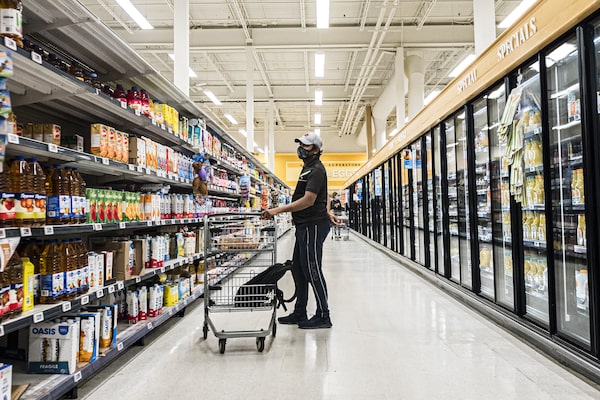
People at a grocery store in Moncton, N.B., on Sept. 22, 2021.Christopher Katsarov/The Canadian Press
On March 8, as a labour dispute at Canadian Pacific Railway dragged on and threatened to further disrupt already plagued supply chains, Save-On-Foods sent a letter to its suppliers. The message: Even if trains across Canada ground to a halt, the grocer expected its product orders to arrive on time – or it would deduct fines from their payments.
While the work stoppage at CP in late March was brief, the letter was just one example of what grocery suppliers say is a concerning trend: retailers continuing to issue “compliance fines” even when orders are late or short because of supply chain problems that are out of companies’ control. They say the issue highlights the need for regulation of the industry.
Backlogs in shipping containers, delays at major ports, and labour shortages in the trucking industry are just a few of the factors that have thrown supply chains into disarray – exacerbated by events such as the flooding in British Columbia late last year.
Retailers say they have been making exceptions to compliance fines amid supply chain snags, including Save-On-Foods. But manufacturers counter that such relief can be hard to come by. They say fines are costing them millions of dollars a year in some cases.
One supplier told The Globe and Mail they were fined even after providing advance notice to retailers about inventory shortages. Another supplier said they have seen a fivefold increase in fines from retailers since the pandemic began.
The Globe is not identifying the suppliers because they were concerned about jeopardizing relationships with key customers.
“Manufacturers are trying to be transparent, to give a heads up to the retailers,” said Michael Graydon, president and chief executive officer of Food, Health & Consumer Products of Canada (FHCP), the industry association. “And some of the retailers are just ignoring it, and continuing to fine.”
Mr. Graydon has communicated with retailers on occasion to ask them to suspend their fines while supply chains are disrupted, as many of them did in the first weeks of the pandemic when suppliers scrambled to meet surging demand for groceries.
The industry has been in discussions to formulate a code of conduct to regulate the relationships between Canada’s grocers and their suppliers. Those talks have stretched on for months longer than expected.
Last summer, federal, provincial and territorial agriculture ministers asked industry leaders to come to a consensus, and to formulate a proposed code by the end of 2021.
After extending that deadline, last week the group of trade associations involved in those talks sent a report to the ministers. While the report said progress had been made, it added that the next step was to bring in people from the industry – retailers and suppliers – to “tackle the major subjects of the code,” including “payments, deductions and fees.” That new working group is meeting this month.
Retail Council of Canada (RCC) president and CEO Diane Brisebois said her organization doesn’t want to spend time arguing over whether there are fines, penalties, or short shipments.
“We are much more concerned about how do we build an environment where there is contractual certainty,” she said. “ … The discussion around the code should help in dealing with those issues right across the board.”
FHCP’s Mr. Graydon acknowledged some fines can be deserved when suppliers do not meet their commitments to retailers. But he said a code could help by requiring retailers to communicate the reasons for such fines before they are charged, and instituting a clear process for dispute resolution if suppliers do not agree they are warranted.
Save-On-Foods issued its letter during the CP labour dispute “in an effort to encourage our suppliers to work with us to avoid the need for recovery fees,” senior vice-president of merchandising Brenda Kirk wrote in an e-mailed statement. When shipments were disrupted during the floods in B.C., the company waived such fines, she added.
“Our approach is to encourage collaboration and communication with our partners to ensure our supply chains are running as efficiently as possible for our customers,” Ms. Kirk wrote.
In an e-mailed statement, Loblaw Cos. L-T Ltd. spokesperson Catherine Thomas said the retailer maintains high standards to ensure products arrive on time and in full, and that it issues fines when suppliers do not deliver on their commitments.
“That said, we work with our vendors all the time to address concerns or supply chain challenges, and many, many vendors – like small businesses and growers – are exempt from this program,” Ms. Thomas wrote. “Common sense rules in cases where we need to be flexible.”
Walmart Canada works to ensure consistent product flow through its stores, spokesperson Adam Grachnik wrote in an e-mailed statement.
“We work collaboratively and transparently with our suppliers … consistent with agreements that we have in place, including considering any exceptions to supply chain or fill rate administrative charges,” Mr. Grachnik wrote, adding that discussions between retailers and suppliers are confidential.
Metro Inc. MRU-T has halted most fines related to suppliers’ service levels, spokesperson Marie-Claude Bacon said. In limited cases, there are fines when suppliers make a commitment to a delivery level that they do not meet, and only two such cases exist right now, she added.
“We’re using our judgment in the current context. And we understand the supply chain issues,” Ms. Bacon said.
Michael Medline, chief executive officer of Sobeys parent company Empire Co. Ltd. EMP-A-T, wrote in a statement that fining suppliers when a pandemic, labour disputes or natural disasters affect their ability to meet their obligations “would be ludicrous and patently unfair.” The company also waived fines after the B.C. floods, he wrote.
“That is only one example. In many cases, we sit down with our supplier partners who have or are enduring factors outside their control and create a joint business plan to bring our performance back to a level we can both rely on,” Mr. Medline wrote. “We agree on terms and when necessary, even relax or remove fees altogether.”
Among retail executives, Mr. Medline has been unusually outspoken in support of creating rules to govern the industry. Empire worked with FHCP last year to propose a code similar to one in Britain, which includes a dispute-resolution system.
“Fairly negotiated rules and policies are necessary for parties – in any industry – to conduct business,” Mr. Medline wrote.
Your time is valuable. Have the Top Business Headlines newsletter conveniently delivered to your inbox in the morning or evening. Sign up today.
 Susan Krashinsky Robertson
Susan Krashinsky Robertson